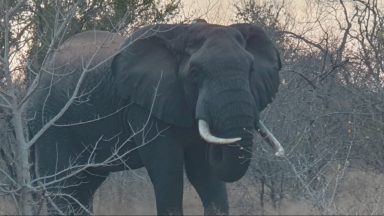Melvin and Calvin are doing a fantastically caring job with this tiny, baby vervet monkey. They picked it up from the bush when they were out on patrol where, sadly, its mother was killed by poachers. You can tell it is very young by its pink face. As it matures it will turn from pink to black.
Unfortunately, vervet monkeys are considered by many to be pests as they often provoke human-wildlife conflict through stealing food and raiding crops. However, like all the animals in the bush, they too have an important part to play in the ecosystem. Not only do they pollinate many flowers with their hair, as omnivores they naturally control insect populations and prevent overpopulation of the finch; without vervet monkeys, the finches could decimate vegetation. Moreover, vervet monkeys are a valuable food source for predators such as leopards and larger birds of prey.
These monkeys live in troops of up to 50 individuals. Every year, from around October to February, the troops expand. The forests are filled with tiny, baby vervet monkeys hanging off their mothers on whom they depend for several months. So, if the mother is killed, or poached as in this case, the monkey can easily be abandoned resulting in its certain death.
When animals are injured or in harm’s way because of human impact, such as with this orphaned monkey, help is on hand and the team do what they can to save it.
Rangers such as Melvin and Calvin, deal with all kinds of situations in their roles in the field. Hunter, the dog at their feet, was one such rescue ( read more here…). The Counter Poaching Manager at the time found him struggling as a pup and brought him back to the camp at Limpopo. Unable to excel at tracking, a place was found for Hunter on the team, keeping large game like elephant away from camp. He also puts a smile on everyone’s face – always there with a wagging tail and a welcome.


